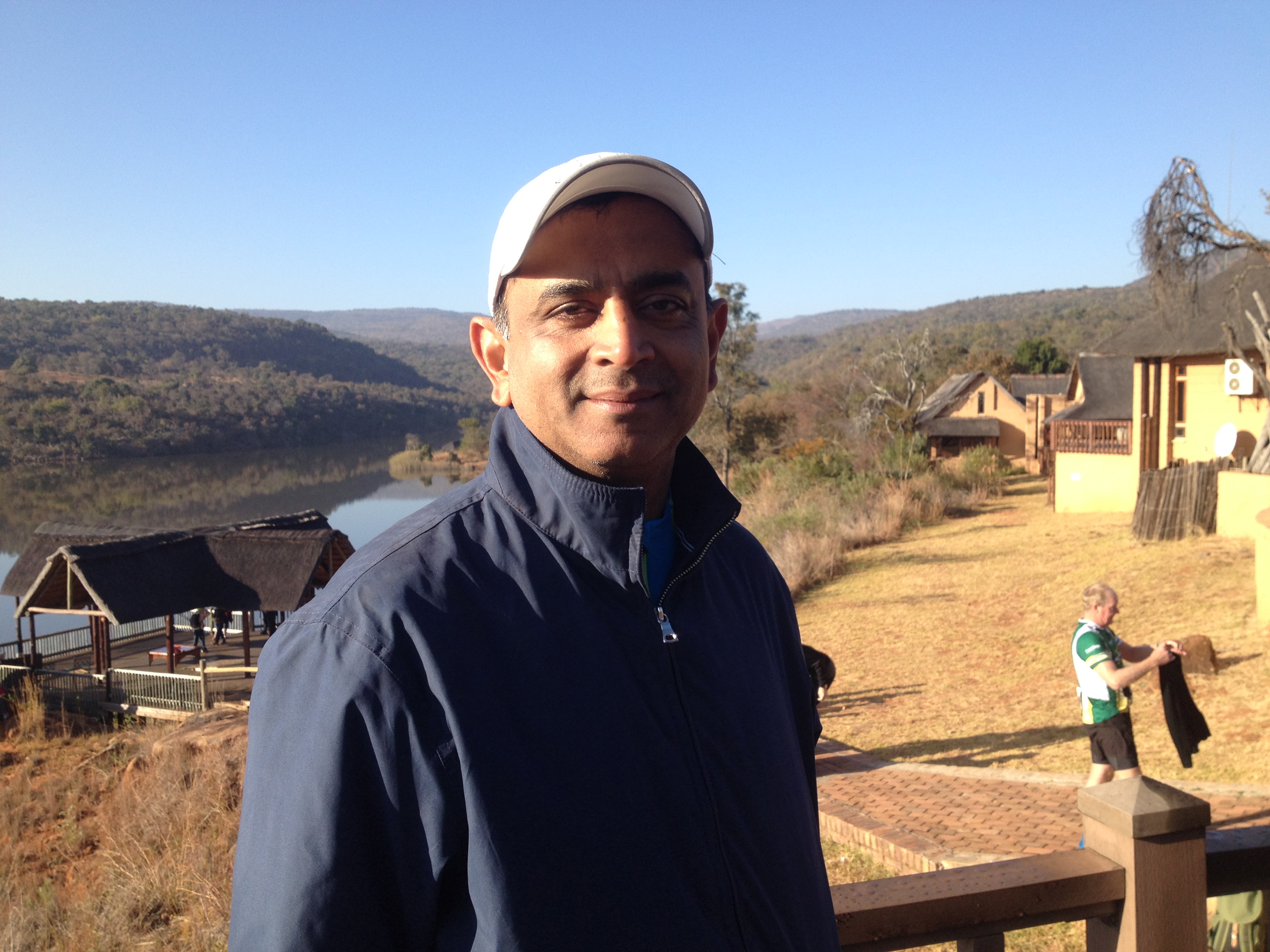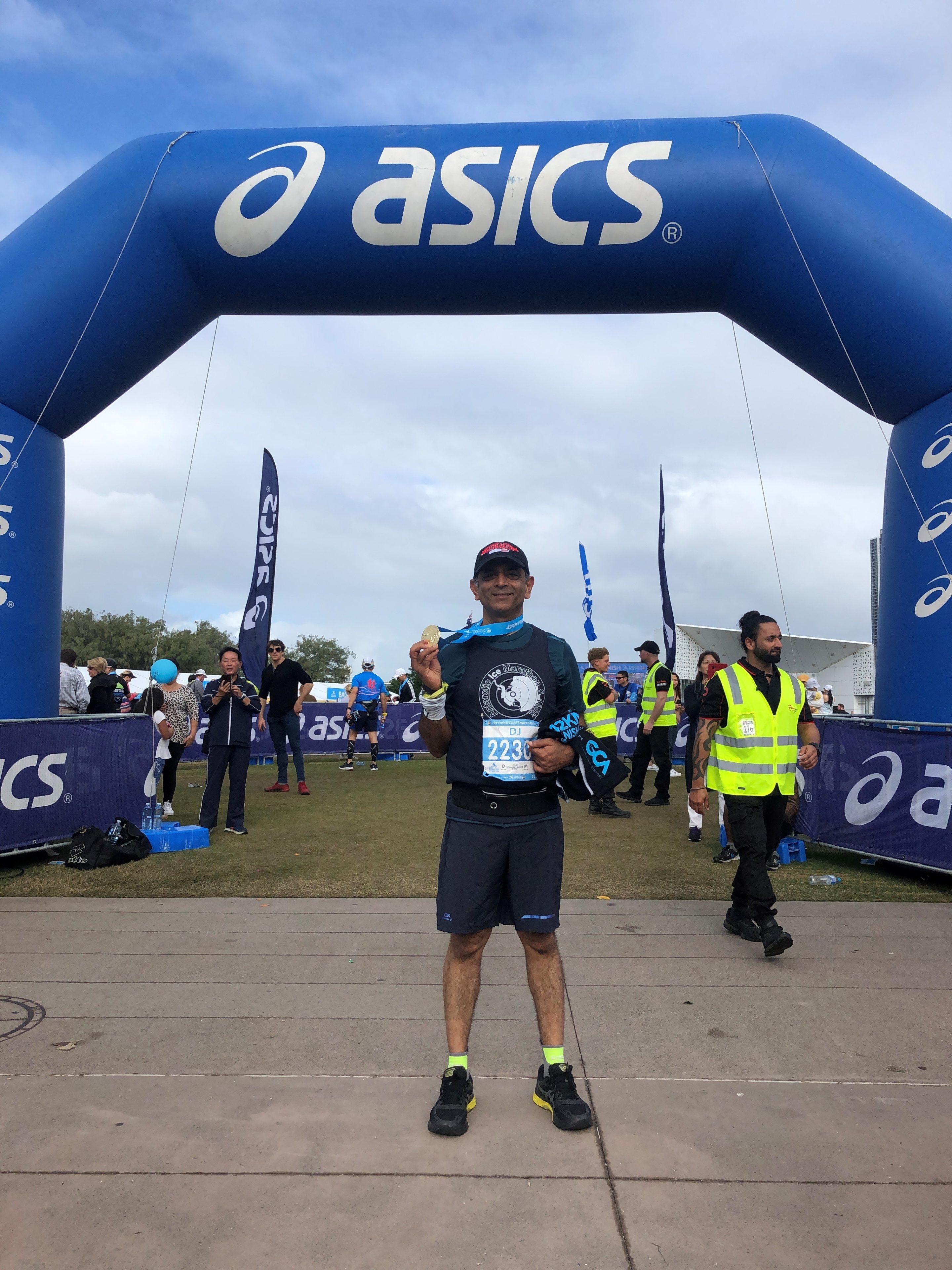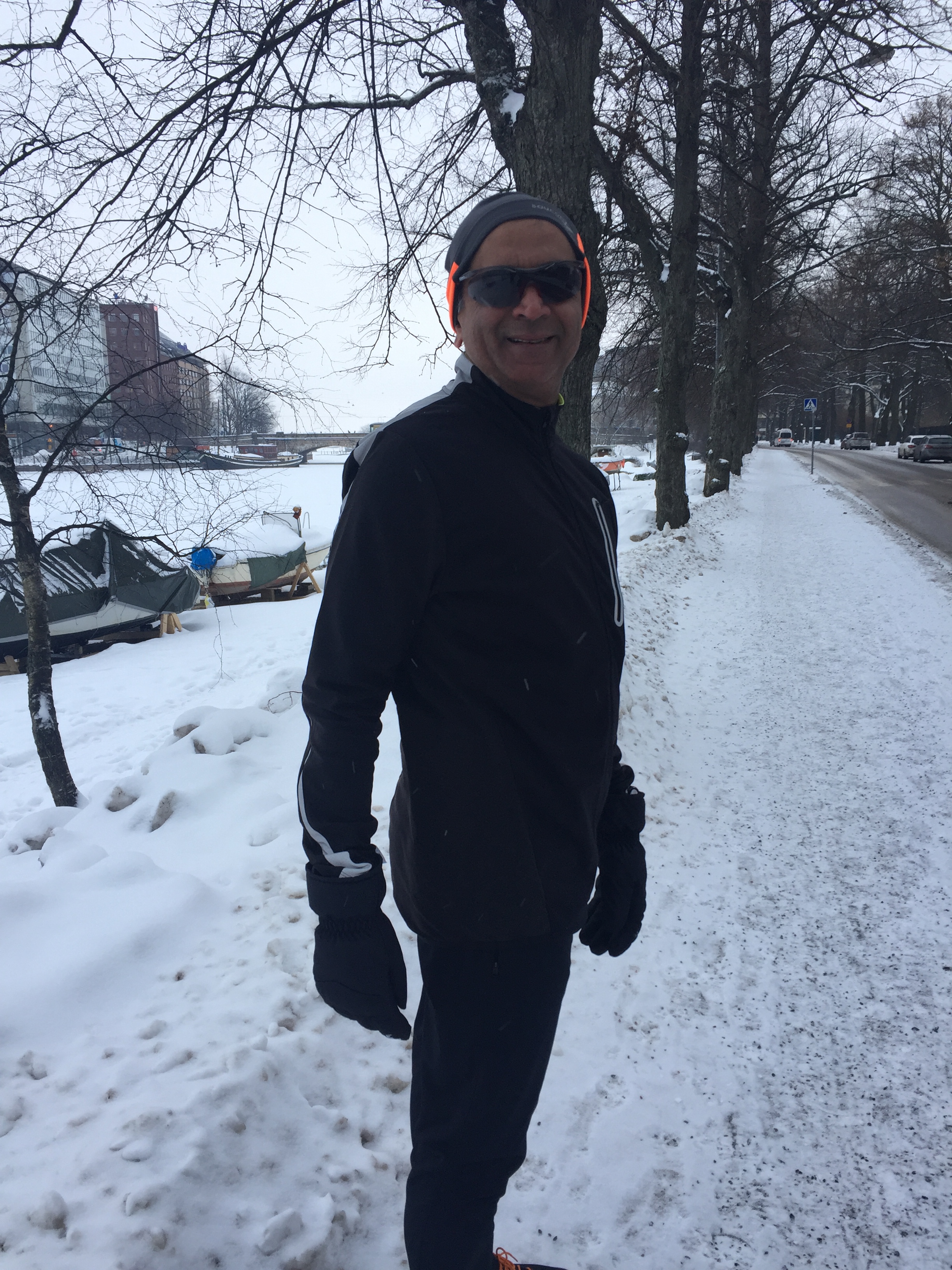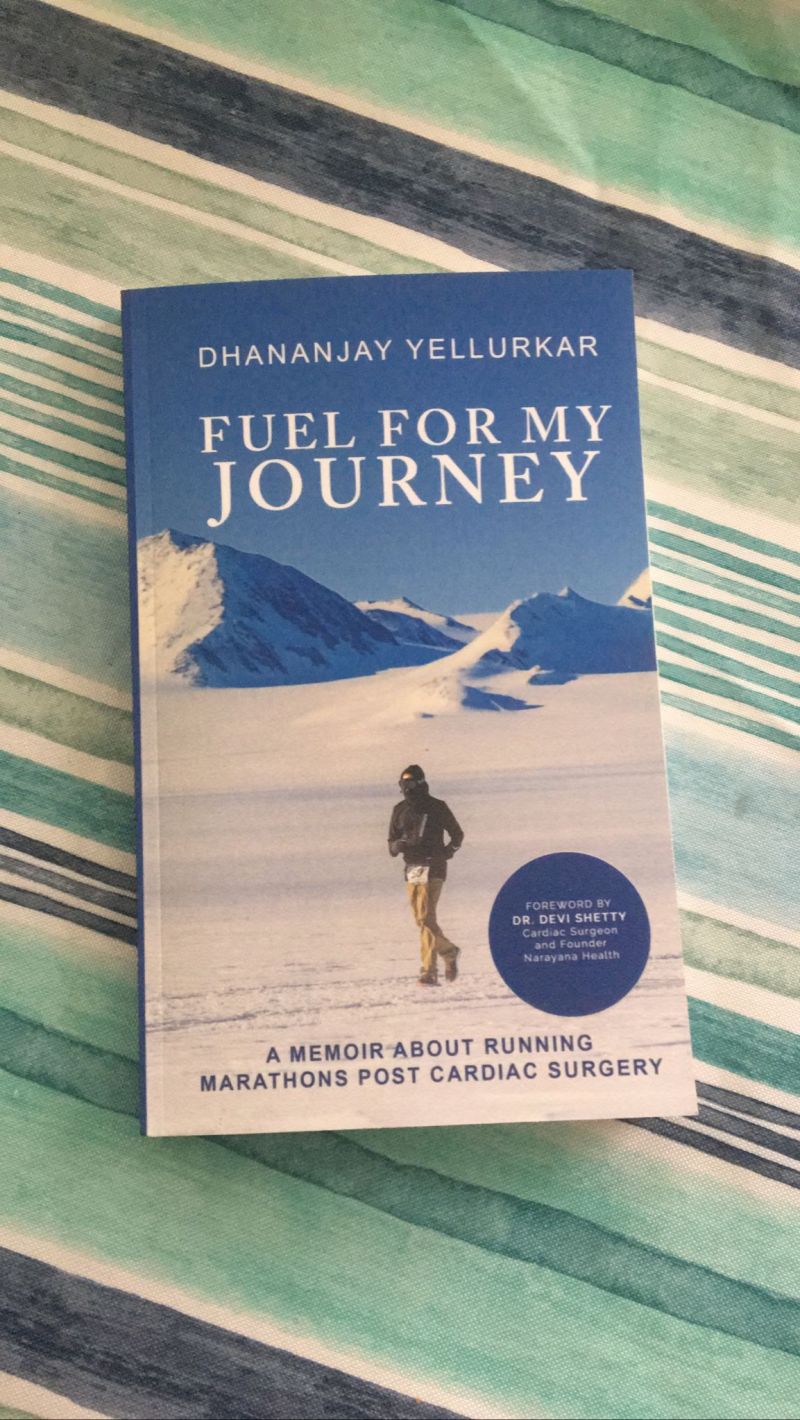One of the attributes of people who seem to be aging well is the ability to take their uniqueness and make it an asset. We are all different, with different challenges, many of which we have no control over. But how we perceive these, and how we present them to the world is something we absolutely have control over.
Dhananjay had a massive coronary event, genetically based and initiated by stress. For someone like that, one would maybe not recommend marathon running as something on the menu of fun activities, and most definitely not marathons in Antarctica, which for anyone sounds wholly unreasonable. But that is what he did. In a safety-first, taking small steps, starting at 2 minutes on a treadmill, he slowly worked his way up in time and distance, training in the streets of Mumbai.
His is a transformative journey from being a breadwinner in his mid-40s, struggling to deal with the aftermath of a major surgery, to becoming a dedicated long-distance competitor. He went on to write a book about his experiences, as it is the rare person who has run full marathons across six continents post heart attack and open-heart surgery. His only aim in running was not to win, but rather to become a better version of himself, finding that running brought to the fore his core values of courage, discipline, honor, humility, kindness, faith and patience.
The human body is remarkably adaptable over time, and as Dhananjay puts it, “There is no such thing as overnight success. It is always incremental.” We have been alive for considerable time, and our circumstances tend to be like ocean liners, difficult to change the direction of. A 1% change in a week, leads to a 52% change in a year. Hard is not impossible, it is just hard, and any change requires perseverance. We are who we are to a great extent because of what we have done. The good news is that if we change what we are doing, we can change who we are. Reasonableness is often overrated.

What is your age?
I am 58.5 years.
Where do you live?
I live in Mumbai, India.
How old were you when you had your heart attack?
I was 46 years old when I had my heart attack and emergency open-heart surgery.
It is interesting that for your work you are a risk officer…and that mitigating risk led to a heart attack. How is that?
I work in a highly competitive financial services sector that is obsessed with growth, quarter-on-quarter. It is nearly 50 quarters since I survived a heart attack while at work and had to go through an emergency open-heart surgery but the growth obsession for the industry continues. Though my role is in Risk, the pressure is still there as targets are for the company.
“Nothing in my lifestyle pointed towards a lurking heart disease”
What was your health condition when you had your heart attack?
I considered myself fit. For a 5 feet 9 inches middle-aged guy I weighed 72 kgs and my blood pressure was 130/90 and cholesterol and sugar levels were also within range. I was regular with my morning walks, had quit smoking and turned vegetarian since past 15 years (since early ’90s). I was a social drinker – glass of wine or two, mainly to celebrate. Nothing in my lifestyle pointed towards a lurking heart disease.
Why did your doctors believe this had happened to you?
Genetics – since the males in my family were prone to heart disease and work-related stress.
What is your health condition now?
I consider myself fit. I have been running around 35 kilometers/week since the past 12 years. The running mileage ramps up while preparing for a marathon. My weight is still around 72 kgs and other parameters are within prescribed range. I still do not smoke and eat vegetarian food (while training for marathons I prefer being a vegan). Drinking wine on social occasion continues.
Have you always been an athlete?
No. I was never into sports.
“I picked up long-distance running post my open-heart surgery”
At what point did you begin running? How did you start? What did your doctors think?
I picked up long-distance running post my open-heart surgery. I had joined a cardiac rehab program in the hospital to gain my confidence post the surgery. I was emotionally down and out and as the only breadwinner of a young family, I had lost my confidence to go back to my regular job. I also doubted whether I was physically capable as any person my age. Since there was no safety net, the only option was to tame these demons in my mind. Attempting a physical activity such as running a marathon was a target that seemed remote but I wanted to achieve it for my physical, emotional and mental wellbeing.
The hospital was the medical partner of Mumbai Marathon and I decided to apply for the half-marathon category. The doctors were reluctant to begin with and wanted me to demonstrate that I could run for 30 mins on a treadmill in the rehab centre with all my parameters within range. I started with an unsure 2-min run on the treadmill and within a couple of weeks ramped up to 30 mins (this was around 2-3 months post-surgery). The doctors slowly came around and asked me to joining a running group and train systematically for the event and provide them weekly updates on my progress. I was advised not to cross heart rate of 145 and to slow down or walk in case my heart rate increased beyond this limit.
I was also advised to get a stress-echo test done a week prior to the event and was given the final go-ahead only on clearing the same. So, within 7 months of heart attack and open-heart surgery, I ran my first half marathon. This remains a rare feat even today.

How did you get to running marathons?
The training process for the half marathon was when I started to regain my lost confidence. I started to enjoy the discipline and rigor and it made me feel good about myself. Post the half marathon event, the running group disbanded but I wanted to continue with my practice runs. Hence, I continued with my training runs and upped my endurance levels by participating in international marathons. I hit upon a formula: train for the marathon and then make a short family holiday as a treat.
Running the Antarctica Marathon
When you ran the Antarctica Marathon, how did you get there?
The travel from Mumbai to Union Glacier base camp set up at the foothills of Ellsworth Mountains in Antarctica itself was a big adventure. It took me over thirty hours of air travel spanning a four-flight journey to reach Punta Arenas in Southern Chile. The following day, 50-odd participants from 16 countries boarded the Ilyushin IL-76D, a Russian transport plane which took four and a half hours to reach Union Glacier. Landing on a blue ice runway, a temporary phenomenon, is risky but the pilots aced it.
What was it like running a marathon in Antarctica?
Three hours of running and I had barely covered 15 kilometers. I could sense my body shutting down slowly. My speech was slurring, and I could feel my jaw tighten. My body was screaming stop. The other fellow runners had by now dispersed into the white wilderness. The only sound that could now be heard was the crunch of snow below my feet and my heavy breathing.
The next seven hours was a period of intense focus and commitment. I needed to conserve my energy levels to reach the finish line. Till the halfway mark, I adopted the run/walk strategy – run between two blue marker flags, walk between the next two. The balance half-marathon distance was covered by walking, one step at a time.
The finish was surreal. Nothing ever can beat the feeling of waving the Indian tricolor at the finish line of one of the toughest marathons at the end of the earth. It made up for all the hardships that I had undergone. In the end, it was hardly a race. It was more of an endurance event testing my physical and mental strength.

What was post-race like?
Post-race, we got stranded at the base camp for a few more days due to poor weather conditions. It was a stressful time for the runners and their families back home. However, the camaraderie that developed among the exhausted runners over alcohol, food and stories was remarkable. For most of us, this marathon had fulfilled one of life’s most treasured dreams.
What is your weekly fitness program?
I get up early around 5 am, walk Patch (my dog) and run for an hour on Tuesdays, Thursdays and long-run on Sundays. When I am not training for a marathon, I run around 35 kilometers/week. While training for a marathon, I follow a 20-week schedule and my peak mileage is around 70 kilometers/week.
“It is a positive story that was written to heal all young breadwinners trying to navigate their life post a major health handicap”
Is age affecting your running?
Yes, but not significantly.
Why did you write your book?
I have come to believe that value lies in not having experiences but in turning them into free-flowing data. My journey from the ICU bed to running marathons across continents is mainly about mind over body, becoming a better person and becoming aware about the impermanence of every moment. It is a positive story that was written to heal all young breadwinners trying to navigate their life post a major health handicap. Post surgery and regular medication, a person can survive and live but to thrive post a major health episode, one needs to switch on awareness that it is always mind over body. Through this book I want to amplify this message. The book details not only the journey and running marathons but it is also an internal journey and the importance of maintaining dignity and humility while overcoming challenges in life.
How long did it take you?
As a first-time author, it took me around 4 months. I used to get up early (4 am) and write a page or two every day without fail before walking Patch and going for a run and then working full day.
What is your ambition for the next couple of years?
Since I have achieved the rare feat of running full marathons in 6 continents (plan to run the Volcano Marathon in Atacama desert, Chile later this year to complete my 7th continent which was delayed due to the pandemic), I want my story and message (mind over body, aim to be a better version on a daily basis, nothing is impossible) to reach young breadwinners across the world — so that they can seek inspiration and bounce back post a health handicap (if they have one during the peak of their career) while retaining their dignity and humility. I want to work towards amplifying this message in the next couple of years.
“The trick is not to find excuses and remain disciplined”
What do you tell people who may not believe they are capable of something like you have done? How does one come to believe that what they have been told is impossible is actually possible?
I tell them that if a regular professional working in an urban megapolis like Mumbai can do it, then anyone can do it anywhere in the world. To run all these international marathons has not been easy — financially, training wise, balancing with a demanding career. I am not a privileged/entitled guy but have to save from my earnings to achieve what I have done. This meant leading a frugal lifestyle. Also training in a city like Mumbai is difficult — the weather is a big hurdle. It is hot during summers and the monsoon season makes it extremely difficult for any outdoor activities. The rest of the months it is humid. There are not many open spaces and traffic is a big issue. Basically, one just has to be disciplined and focused. Getting up early every day for run/exercise for the past 12 years before heading for demanding day at work is not easy but not impossible, too. To get out of bed without anyone to cheer you (or give you a medal after your long run) requires discipline but once you master it, anything can be achieved. The trick is not to find excuses and remain disciplined. Then location, money and demanding career are no longer road blocks in your journey.
I also tell them that there is no such thing as overnight success. It is always incremental. One step at a time. But they have to take the first step and be consistent. Equating being consistent with being boring is myth that is always busted by achievers. Nothing meaningful in life is easy.
You can become your own hero… by remembering that it is always mind over body.
What are the 3 non-negotiables in your life?
No compromise on my disciplined lifestyle.
Always have the courage and curiosity to explore newer boundaries/adventures.
Mantra of mind over body.
Main image: Copyright Mark Conlon/Antarctic Ice Marathon
LEAVE A REPLY
The ideas expressed here are solely the opinions of the author and are not researched or verified by AGEIST LLC, or anyone associated with AGEIST LLC. This material should not be construed as medical advice or recommendation, it is for informational use only. We encourage all readers to discuss with your qualified practitioners the relevance of the application of any of these ideas to your life. The recommendations contained herein are not intended to diagnose, treat, cure or prevent any disease. You should always consult your physician or other qualified health provider before starting any new treatment or stopping any treatment that has been prescribed for you by your physician or other qualified health provider. Please call your doctor or 911 immediately if you think you may have a medical or psychiatric emergency.




Awesome story!!!! Way to go!!!!
Truly inspiring. The Importance of discipline and belief in oneself is perfectly exemplified by how Dhananjay has bounced back after hitting rock bottom.
Truly awesome – an inspiration for people like me to get fit!!
Mind over body is a great reminder for all of us . I believe this but sometimes remembering that is difficult and complaining about the pain and making excuses is easier.
Discipline in every activity is success in itself. Self motivation is lasting motivation. Well done yellurkar. Lot to emulate in day to day life.
Mesmerising and inspiring. You have done a remarkable human story in your life. The endurance, perseverance and the amount of confidence you brought to your story will inspire millions.